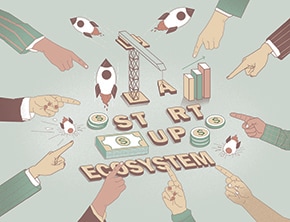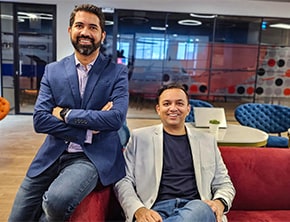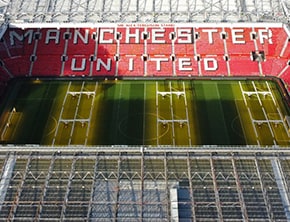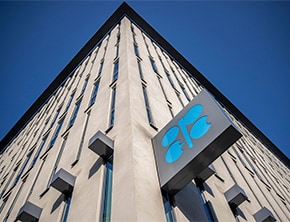
From the troubles of Indian startup ecosystem to the possible sale of Manchester United, here are our most-read stories of the week
Vinay Dube's plan at Akasa Air, falling share prices, leadership lessons from Sanjiv Mehta are some of the stories that piqued the interest of our readers this week
 Image: Shutterstock
Image: Shutterstock
1) Hoopla and hubris
 Trell, BharatPe, Zilingo, GoMechanic, bijnis, and now Mojocare–the list of Indian startups tangled in financial irregularities has been growing since the funding winter gripped the ecosystem in 2022. In the words of Warren Buffet, "Only when the tide goes out do you discover who's been swimming naked." This shift in the ecosystem has found founders blaming VCs for pushing them to deliver a silver bullet. And VCs accusing founders of losing sight of governance, playing fast and loose with cash burn, and compromising their integrity. Is there a way to fix the system, or will we just be pointing fingers? Read more
Trell, BharatPe, Zilingo, GoMechanic, bijnis, and now Mojocare–the list of Indian startups tangled in financial irregularities has been growing since the funding winter gripped the ecosystem in 2022. In the words of Warren Buffet, "Only when the tide goes out do you discover who's been swimming naked." This shift in the ecosystem has found founders blaming VCs for pushing them to deliver a silver bullet. And VCs accusing founders of losing sight of governance, playing fast and loose with cash burn, and compromising their integrity. Is there a way to fix the system, or will we just be pointing fingers? Read more
2) Hungry for more
 Vinay Dube started Akasa Air nine months ago. Today, it enjoys a market share of about five percent. This incredible growth is the fastest any airline has managed in India. Now it is looking to chew more with the slow addition of aircraft to its fleet. Akasa’s growth also indicates the enormous underlying potential for travel in the country, driven by a growing middle class and rising disposable income that tends to be spent on travel. Boeing has spotted a way to make money off Akasa's big plans to improve market share and expand routes. What did Vinay Dube, also CEO of the airline, do differently? Read more
Vinay Dube started Akasa Air nine months ago. Today, it enjoys a market share of about five percent. This incredible growth is the fastest any airline has managed in India. Now it is looking to chew more with the slow addition of aircraft to its fleet. Akasa’s growth also indicates the enormous underlying potential for travel in the country, driven by a growing middle class and rising disposable income that tends to be spent on travel. Boeing has spotted a way to make money off Akasa's big plans to improve market share and expand routes. What did Vinay Dube, also CEO of the airline, do differently? Read more
 Sanjiv Mehta started his career with Union Carbide in 1983 and was a part of the crisis management team for the Bhopal Gas tragedy in 1984. His three-decade stint at Unilever started soon after when he moved to Unilever Arabia as the commercial head for home and personal care products. He has held leadership positions at Unilever’s outings in Bangladesh, the Philippines, and its Middle East and North Africa business. With signature victories in each role and as someone always on the lookout for the next big Indian idea, Mehta soon landed the top job for HUL in India. After spending over 30 years with the FMCG giant, Mehta will step down later this month. Here are five lessons from a true captain of industry.
Sanjiv Mehta started his career with Union Carbide in 1983 and was a part of the crisis management team for the Bhopal Gas tragedy in 1984. His three-decade stint at Unilever started soon after when he moved to Unilever Arabia as the commercial head for home and personal care products. He has held leadership positions at Unilever’s outings in Bangladesh, the Philippines, and its Middle East and North Africa business. With signature victories in each role and as someone always on the lookout for the next big Indian idea, Mehta soon landed the top job for HUL in India. After spending over 30 years with the FMCG giant, Mehta will step down later this month. Here are five lessons from a true captain of industry.  In February 2022, Amazon announced that it was shutting down publishing house Westland, a wholly owned subsidiary of Amazon Eurasia Holdings SARL, from March 31, 2022. It was a bolt out of the blue for India’s publishing industry, which was already worried about declining readership, changing preferences, and the rise of e-books. Ranjeet Pratap Singh, co-founder and CEO of digital self-publishing platform Pratilipi, rushed to acquire Westland. The move brought together two publishers completely different in their approaches to storytelling. Pratilipi focused on user-generated stories on new-age platforms, while Westland was more traditional but with an impressive roster of authors. It has been a year since the two found each other. Has Wasteland found ways to embrace the tech-forward style of Pratilipi?
In February 2022, Amazon announced that it was shutting down publishing house Westland, a wholly owned subsidiary of Amazon Eurasia Holdings SARL, from March 31, 2022. It was a bolt out of the blue for India’s publishing industry, which was already worried about declining readership, changing preferences, and the rise of e-books. Ranjeet Pratap Singh, co-founder and CEO of digital self-publishing platform Pratilipi, rushed to acquire Westland. The move brought together two publishers completely different in their approaches to storytelling. Pratilipi focused on user-generated stories on new-age platforms, while Westland was more traditional but with an impressive roster of authors. It has been a year since the two found each other. Has Wasteland found ways to embrace the tech-forward style of Pratilipi?  Micro, small and medium enterprises (MSMEs) always need help accessing finance from large lenders. Before introducing the Goods and Services Tax (GST), voluminous paperwork and the need for physical verification of services meant that smaller suppliers were serviced by micro-finance companies and moneylenders and rarely by large banks. Have we heard this before? Countless times. Has anyone considered this an opportunity to create a business, bridge the gap, and help the underserviced sector? Quite a few startups have done that. So how is Akshat Birla and Aljo Joseph's BharatNXT different?
Micro, small and medium enterprises (MSMEs) always need help accessing finance from large lenders. Before introducing the Goods and Services Tax (GST), voluminous paperwork and the need for physical verification of services meant that smaller suppliers were serviced by micro-finance companies and moneylenders and rarely by large banks. Have we heard this before? Countless times. Has anyone considered this an opportunity to create a business, bridge the gap, and help the underserviced sector? Quite a few startups have done that. So how is Akshat Birla and Aljo Joseph's BharatNXT different?  Petrodollars/oil money taking over football clubs, inviting star players from Europe's premium clubs to build their home-grown leagues have found the top spot in the news even before the transfer season began. But what happens when a legendary club like Manchester United is reportedly put on the block? A consortium led by Sheikh Jassim bin Hamad al-Thani, one of Qatar's richest men, is in exclusive talks to buy the iconic English sports club for $6 billion. The rise of the influence of the middle eastern emirates in European football deserves a conversation on our new podcast ToThePoint.
Petrodollars/oil money taking over football clubs, inviting star players from Europe's premium clubs to build their home-grown leagues have found the top spot in the news even before the transfer season began. But what happens when a legendary club like Manchester United is reportedly put on the block? A consortium led by Sheikh Jassim bin Hamad al-Thani, one of Qatar's richest men, is in exclusive talks to buy the iconic English sports club for $6 billion. The rise of the influence of the middle eastern emirates in European football deserves a conversation on our new podcast ToThePoint.  Despite forecasts of a looming oil market deficit of 2.4 million barrels per day, prices have remained surprisingly low. OPEC+, the 23-member alliance of oil producers, including heavyweights Russia and Saudi Arabia, agreed to leave their production target unchanged for this year to tighten the market. But this move is not a novel step toward controlling oil prices. It has been used before, and it has failed spectacularly thanks to lower-than-expected discipline by OPEC+ in adhering to production cuts. In this mix, add the failure to stimulate the Chinese economy and interest rates hikes across economies, and we might get a broad picture of why the oil prices are at a low.
Despite forecasts of a looming oil market deficit of 2.4 million barrels per day, prices have remained surprisingly low. OPEC+, the 23-member alliance of oil producers, including heavyweights Russia and Saudi Arabia, agreed to leave their production target unchanged for this year to tighten the market. But this move is not a novel step toward controlling oil prices. It has been used before, and it has failed spectacularly thanks to lower-than-expected discipline by OPEC+ in adhering to production cuts. In this mix, add the failure to stimulate the Chinese economy and interest rates hikes across economies, and we might get a broad picture of why the oil prices are at a low. 



